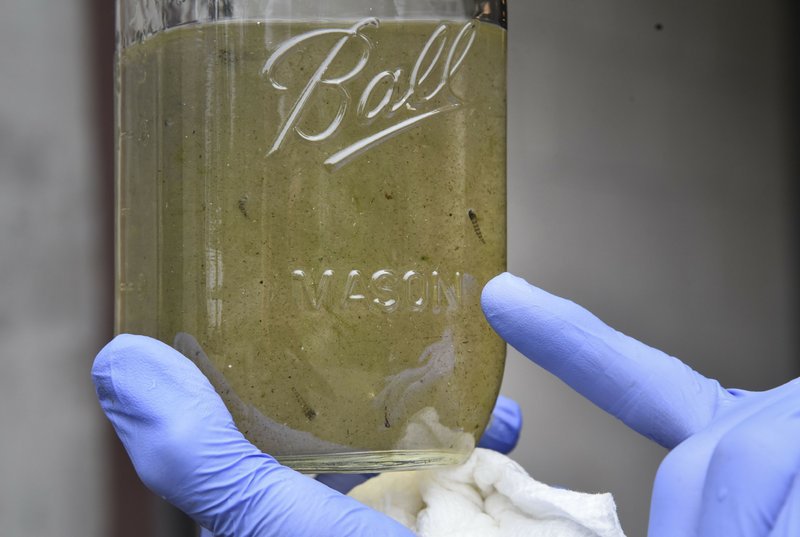In this May 23 2019 file photo, Southern Connecticut State University professor Vincent Breslin holds a sample of water that contains possible microplastics at the North Haven Water Treatment Plant on Universal Drive. The World Health Organization says the levels of microplastics in drinking water don’t appear to be risky, but that more research is needed into their effects on the environment and health. A WHO report released Wednesday, Aug. 21, said the minuscule plastics are ubiquitous in the environment and have been found in both tap and bottled drinking water. (Bailey Wright/Record-Journal via AP)
“[J]ust because we’re ingesting them doesn’t mean we have a risk to human health. The main conclusion is, I think, if you are a consumer drinking bottled water or tap water, you shouldn’t necessarily be concerned.” –Bruce Gordon, the coordinator of water, sanitation, and hygiene for the WHO, in reference to microplastics in drinking water. The report claims that the current levels of microplastics in water likely aren’t dangerous to human health, and argues that bacteria causing waterborne diseases like typhoid and cholera should be a much greater concern. Associated Press
Mr. Gordon acknowledged, that the available data is “weak” and more research is needed. H
This report is WHO’s #1 review that investigates potential human health risks of microplastics.
Andrew Mayes, a senior lecturer in chemistry at Britain’s University of East Anglia who didn’t participate in the WHO report, agreed that microplastics in water don’t appear to be a health worry for now.
“But I wouldn’t want people to go away with the idea that microplastics are no longer important,” because they might be harming the environment, he said.
“We know that these types of materials cause stress to small organisms,” he said. “They could be doing a lot of damage in unseen ways.”
“Even if we stop (adding) plastic to the environment right now, microplastics will increase as larger pieces divide into smaller and smaller pieces,” Mayes said, adding scientists have little understanding of the long-term consequences.
Gordon said that although WHO would continue to monitor levels of microplastics in water, the higher priority is proven risks in drinking water like bacteria that cause typhoid and cholera.
“These are things that cause immediate illness and can kill a million people,” he said.

Ian: So…. because they are working on improving protection from bacteria in water… is he suggesting that microplastics shouldn't be a priority?? And what about the latest report that says PFOA's, this month's star contaminant derived from the use of fire fighting foam – is in ALL water supplies in the US? And of course the old favourite.. lead.. in over 200 US cities at unacceptable levels..and oh yes, that report last week of foetal brains being affected by fluoride.
So… you still don't think a water filter is a good – a VERY good idea?

Talk to Leon in USA
Talk to Angela in Canada
Talk to Callum in UK
Talk to JJ in Singapore and Malaysia
Talk to Michael in Australia
Talk to Leon in NZ

